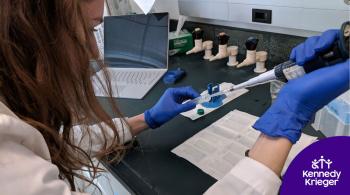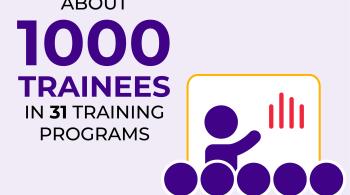BALTIMORE, May 30, 2025—A Kennedy Krieger Institute researcher is playing a role in a major international effort that has yielded a promising first-ever drug treatment for cerebral adrenoleukodystrophy (cALD)—a rare, often fatal genetic brain disease that impacts boys between ages 3 and 12.
The investigational drug, leriglitazone, is being studied in the NEXUS trial. This is a multiphase international clinical trial currently underway across the United States, Europe, and South America. The latest 6-month analysis among 11 patients found that leriglitazone slowed disease progression in all participants. Even more exciting, in nearly half of the boys, it appeared to halt the disease entirely. This is a very promising early signal for a potentially effective drug-based treatment for cALD.
Dr. Eric Mallack, Director of Clinical Research at the Moser Center for Leukodystrophies at Kennedy Krieger and senior author of the study, says this moment has been years in the making.
“This is the first sign that an oral medication could slow down this devastating disease,” said Mallack. “It is through collaboration with our international colleagues that are we able to take this major step towards a safe, accessible treatment.”
Dr. Mallack contributed to the study design, MRI scan assessments, analyzed and interpreted study data, and helped define key outcome measures. His years of MRI and disease natural history research were particularly instrumental in making this trial possible.
Currently, the only treatments for cALD are traditional stem cell transplantation and stem-cell gene therapy. Both are considered high-risk procedures that often aren’t an option for patients due to timing, complications, or lack of access. If approved, leriglitazone would become the first-ever oral drug for cALD.
“This is the result of years of work and global collaboration,” said Dr. Mallack. “We’re proud to be part of the team advancing the science for the families who need it most. We are hopeful this leads to a safer, more accessible treatment option.”
Final results from the NEXUS study are expected in 2025. Visit our website for more information about Kennedy Krieger’s research into cALD and other leukodystrophies.
###
About Kennedy Krieger Institute
Kennedy Krieger Institute, an internationally known, non-profit organization located in the greater Baltimore/Washington, D.C. region, transforms the lives of nearly 30,000 individuals a year through inpatient and outpatient medical, behavioral health and wellness therapies, home and community services, school-based programs, training and education for professionals and advocacy. Kennedy Krieger provides a wide range of services for children, adolescents and adults with diseases, disorders or injuries that impact the nervous system, ranging from mild to severe. The Institute is home to a team of investigators who contribute to the understanding of how disorders develop, while at the same time pioneer new interventions and methods of early diagnosis, prevention and treatment. Visit www.kennedykrieger.org/ for more information about Kennedy Krieger.















